Capturing Moments: DSM Students Embrace Theatre
Exploration in Ninasam and Bangalore, Focusing on Acting Training

Theatre (and the arts as a whole) offer a profound journey into how to become an actor, connecting us universally. This may sound like a tired cliche, but the buzzing bus full of DSM students arriving at the Ninasam Theatre Institute (Nilakanteshwara Natyaseva Sangha) in Heggodu, Karnataka, were about to discover how thrillingly reaffirming true this notion was (and is), underscoring the importance of acting classes.

The initial focus was on appreciating the natural beauty surrounding the Ninasam campus: serene silence, lush trees, chirping birds, verdant landscapes, and friendly dogs making the shade of trees and buildings their own, a joy to observe, pet, and engage with.
One of the earliest experiences in fostering a community of artists across DSM and NTI was sharing meals in the mess hall, where everyone gathered for communal dining. The air was filled with the inviting aromas of sabzi, idli, dosa, and some of the most flavorful sambar and rasam many of us had ever savored, highlighting the importance of acting training.

What sets this exchange program apart is the diverse backgrounds of each group of students hailing from various parts of the country, each undergoing distinct styles of acting training. DSM students were introduced to NTI’s adaptation of The Sultan’s Dilemma by Tawfiq alHakim, performed in Kannada.
Despite the language differences, the physical prowess displayed by NTI performers and the richness of live music made the play exceptionally captivating. It was remarkable to witness a
robust audience of regular theatre enthusiasts in such a remote setting.
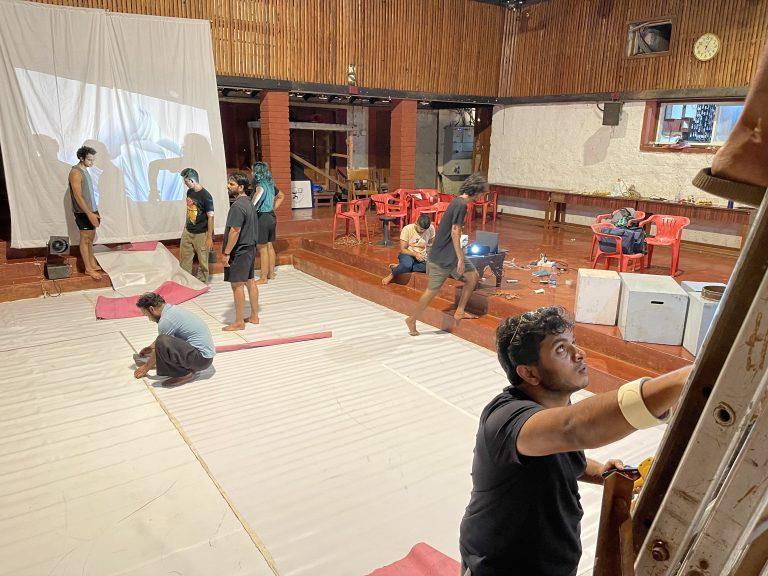
The following day, DSM students prepared and arranged NTI’s picturesque sunken theatre, where they would stage their adaptation of Girish Karnad’s The Fire and the Rain titled Agni aur Barkha.
The performance differed significantly from NTI’s production due to distinct training, artistic influences, and cultural contexts. Despite language differences, DSM's innovative approach with performances, digital projections, and artistic treatments sparked numerous discussions and intriguing conversations between DSM and NTI students.
In one of many dialogues between the student groups, Akshara sir emphasized the importance of feedback, stressing that 'judgement' should never be the intention or assumption. This created an environment where everyone could openly and freely learn from each other,
allowing diverse perspectives to shape our artistic outlook.

The days at Ninasam were packed with enriching activities, from morning martial arts and movement sessions led by Manju sir, who also led us on a scenic forest exploration. The theatre resonated with the vibrant harmonies of 35 voices during Arun sir’s engaging joint music classes, focusing on rhythm and singing Kannada songs, illustrating the diverse aspects
of acting classes and how they contribute to becoming an actor.

After a quick and satisfying lunch together, everyone regained their energy for the next sessions of the day whether it was a devising and improvisation session or an intriguing workshop on creating a human puppet using only newspaper and tape. These activities showcased the practical aspects of acting training and provided insights into how to become
an actor through creative exploration in acting classes.
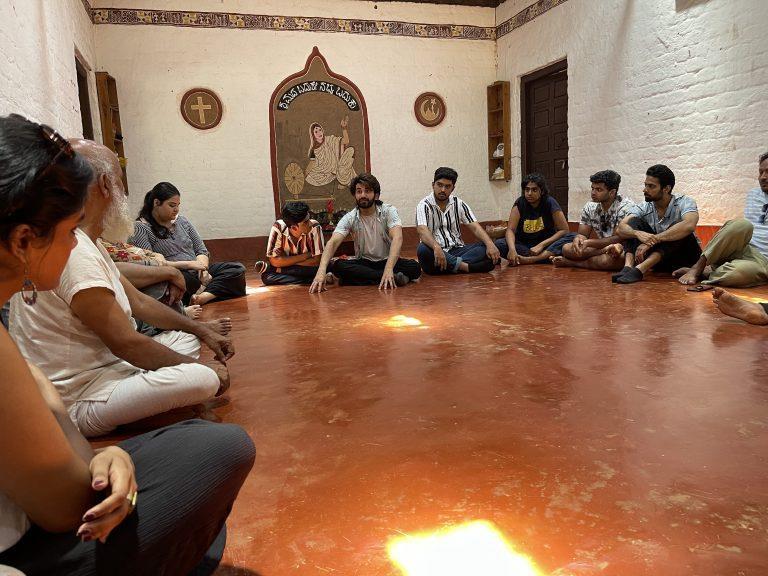
The students were also enriched by interactions with renowned theatre practitioners and performance instructors. Prasanna, the famed theatre practitioner, director, and educator, engaged the students in a profound discussion. He urged us all, as aspiring performers, to reconnect with our bodies and senses, simplifying our approach to acting by focusing on what
is present and immediate within us.
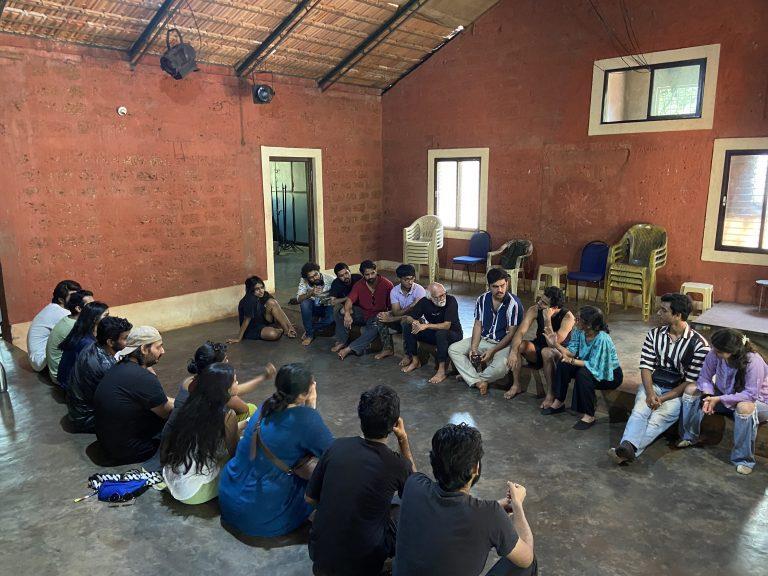
Visiting KG Krishnamurthy’s home was a rare treat; sitting in a fully functional theatre built in his own home and sipping on delicious kokum sharbat, Krishnamurthy sir held an engaging conversation on how his work in teaching and putting up theatre for children holds so much importance for the artistic future of India.
Wrapping up our time at Ninasam left too many learnings and experiences to list. Trying to squeeze in one more filter coffee, Mangalore bun, or ice cream, we said goodbye to our new
friends and collaborators and left significantly richer in every artistic sense of the word.

After a long, almost 22-hour bus ride from Mumbai to Bangalore, half the current in-city batch of DSM students began their exchange program. They were accompanied by wellknown theatre director Sunil Shanbag and, DSM’s current academic head, Irawati Karnik, who were also their mentors for the program. The entire 8-day experience seemed to enrich
the students mentally, emotionally, and intellectually. Thanks to both Ira and Sunil’s hard work, the program was comprised a wide range of lectures, conversations, and workshops with some of Bangalore’s most relevant theatre makers such as Lakshman KP, Sharanya Ramprakash, senior members of theAravani Art Project, and Tara Kini and the Drupad Choir.

After completing a performance of their student production ‘Mitti ki Gaadi’(an adaptation of Sudraka’s Mrichhakatika in Sanskrit) directed by Sapan Saran, the students delved into conversations over the course of 5 days with these theatre makers. On the last two days, they rehearsed and performed a 15-minute theatrical piece, in smaller groups, which was an
expressive commentary on their experience in Bangalore.

In one of their first encounters, the students delved into multifaceted Sharanya Ramprakash’s work. Afeminist theatre-maker who consistently uses her privilege to shed light on underrepresented and marginalised communities, Sharanya went from successfully doing theatre in the city to being the first and only woman at the Yakshagana Kendra in 2014 in a small village near Bangalore. She shared her experience of immersing in the culture of the all-male Yakshagana troupe versus adopting a certain form as a technique at a distance from
the culture. When does a piece of work stop being original and instead starts appropriating?

These questions led to Sharanya sharing her motivation behind creating her award-winning play ‘Akshayambara’. What happened when she brought her Yakshagana training to the contemporary stage? The play is a two-hander between a male Yakshagana artist who plays Draupadi, and Sharanya, who plays the Pradhana Purushavesha of Kaurava. The two actors flit between green room and stage, going from female to male to female to male over and over again, brewing tensions and arguments of femininity and masculinity, and playing with the female struggle to become a man and be masculine. Sharanya spoke about the various dualities in the play that arose from her own struggles with the culture as well as the form, especially the duality of the two actors staying within the bounds of tradition “on-stage” but
confronting the contemporary world in the dressing room.

The conversation about cultural appropriation continued over the course of the next sessions. More so as the students got to know the senior members of the AravaniArt Project, a nonprofit that creates art projects with people from the transgender community. The students met these artists in their creative space and understood the process of creating their play ‘Nava’, which nine of them had created with Sharanya. This community of transwomen and artists makes murals, sells their art in the form of postcards and paintings . Since most of these transwomen are uneducated, their script was written orally over a series of 250 voice notes on

Sharanya Ramprakash and her troupe went through a 6-month long process owing to the many obstacles these trans women faced such as being imprisoned for their sex work, hospitalisation due to physical abuse from their clients, alcohol addiction and its consequences, to name a few – aspects that artists with the basic privileges of societal acceptance and safety don’t have to often consider or pause for. Nava worked with strong ethics that aren’t usually followed, shared Sharanya. If one of them was late to a rehearsal or a show due to external forces, the rest of the team would wait for them. In their own spaces, the students contemplated if Sharanya directing a play with nine transwomen based on their stories and experiences was cultural appropriation or if she was using her privilege to represent the underrepresented. Does she profit physically, emotionally, intellectually, and spiritually from the experiences of these communities or return it all back to them by investing in the community, their expression, and stories, in as well as, beyond the theatrical
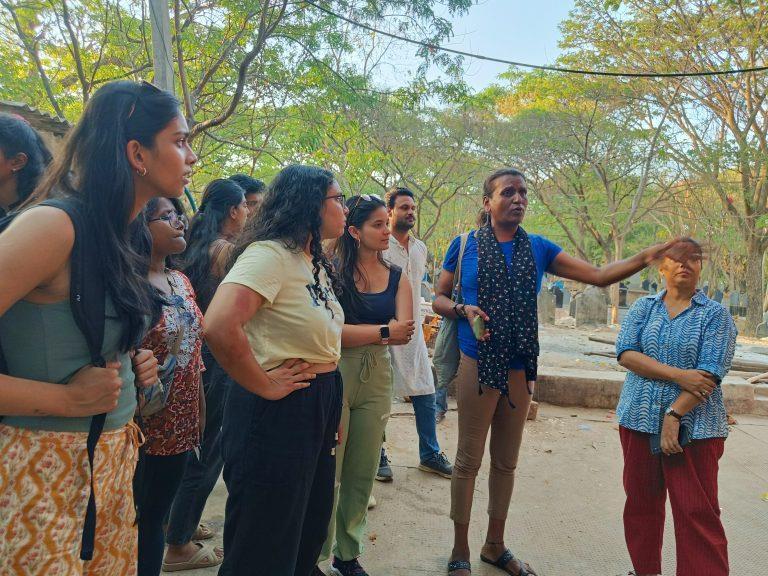
The students also visited a graveyard with the members of the Aravani Art Project where they saw a large idol of Goddess Kali and learned about the annual festivities that are led by the trans community in Bangalore; the one day in the year when they are treated as magical goddesses unlike all the other days when they are mistreated and abused.
Additionally, students also spent time with many graves of babies (who had been born and passed away during Covid times) to people who seemed to have lived a long and prosperous
life. This imagery and revelations added enormously to their self-developed theatrical pieces.
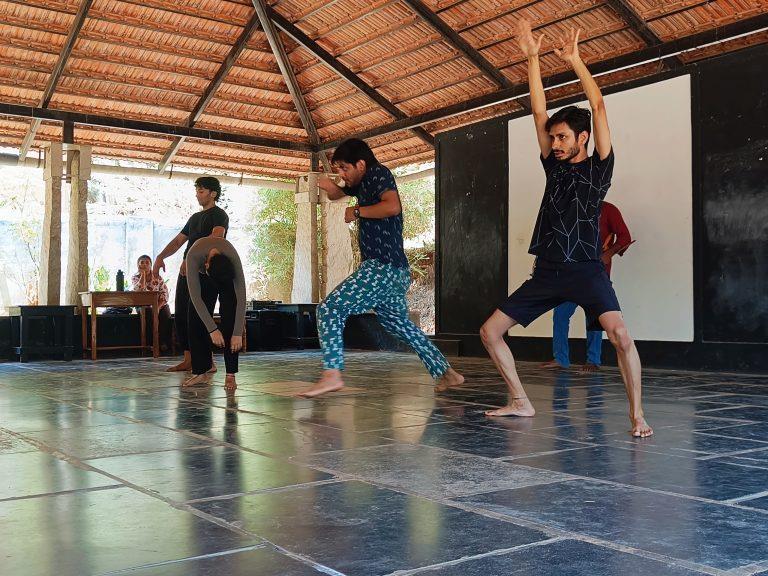
Next in their journey was co-founder of Jangama Collective Lakshman KP who came in with Narasimharaju BK and worked with the students on movement to the instrument Arrai (an instrument that looks and plays like a dhol but also creates drone-like frequencies), finding silences in your mind and body, and being gentle on oneself through it all. Lakshman read them a poem by Kotiganahalli Ramaiah called, ‘Nannajja’ (translation: ‘My Grandfather’) and then delved deep into the creation of his play ‘Daklakatha Devikavya’, a play that represents the Dalit community in all its forms by artists (some trained, some not) from the community. The conversation revolved around being defined by identity – given at birth versus a created and chosen one as an individual as well as a community.

As the workshop progressed and Lakshman spoke more about the inequalities in the society and revealed what his next play was about, a student asked him if he would ever make a play just about ‘love’. Lakshman is often asked this question, especially after having made three plays that speak to the caste and class inequalities – which is practically nothing compared to the long history of plays that already exist which do not address this. In his response, Lakshman said that he would love to speak of simply love as soon as his life also becomes about only love, where he does not have to deal with sneaky questions about revealing his last name, about his meat-eating habits while looking at houses to rent, and as soon as the
caste and class inequalities cease to exist and run our society.
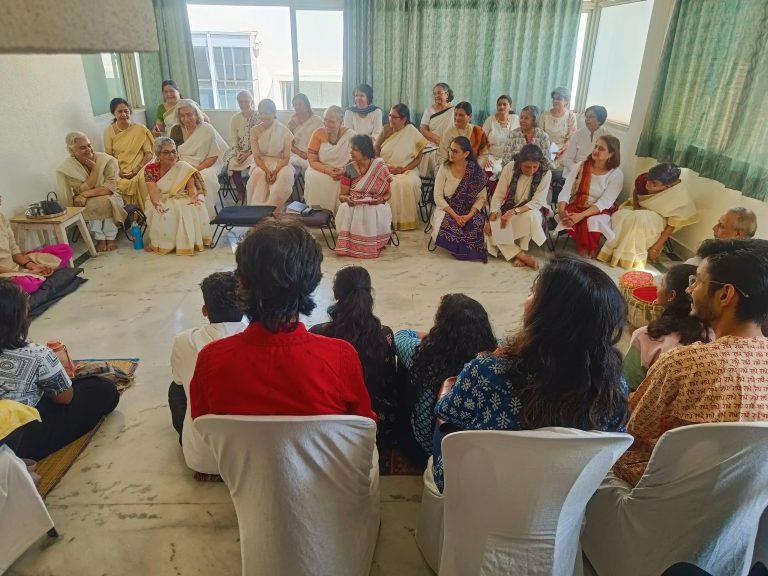
Following these politically charged and introspective sessions, when the students met the Drupad Choir for a workshop with singer Tara Kini, they saw what pursuing art in the later stages of life can look like. The joy, the passion, the love these “amateur (claiming)” artists found after their retirement posed as a hopeful mirror for students. Filled with curiosity, all the students and the members of the Drupad Choir asked each other questions, answered them generously, and ate delicious food together. They practised Dhrupad rhythms and
singing style with Tara Kini and left feeling satiated in all.
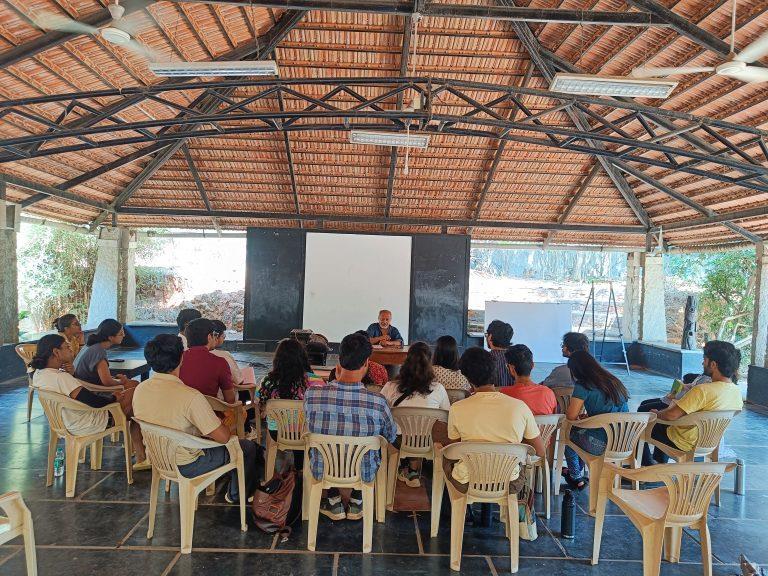
Most of these days ended with ‘End of Day Reflections’with Sunil and Ira which clarified a lot of the students’concepts and questions. Additionally, they developed and performed their creative pieces under Sunil’s mentorship. The pieces delved into and explored many topics such as life and death, cultural appropriation and its impact on the undervalued and underrepresented communities, finding your voice lost to gender norms and societal expectations etc. It was a long 8 days for everyone involved but it enriched each of them individually and as an ensemble, since some of these pieces have come back to Mumbai and have become a part of their final presentationAadyant before graduation, which are fully student-led and developed. More on that next month.
